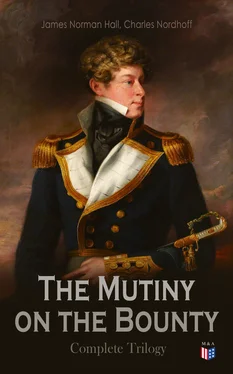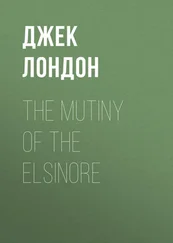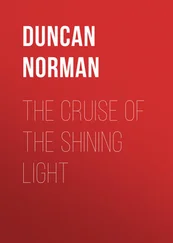“No!” she exclaimed; “you are wrong. I have seen some of those people, who came here in a large canoe five years ago. They are savages! You should have killed them all and taken their island!”
“You are fierce, Hina,” I said with a smile. “Why should we kill innocent men, whose only fault was love of their land? Had we desired to kill them, Christian would not have allowed it.”
“He was foolish, then. Did they not try to kill him, and you? But what will you do, now that you have returned? Shall you be long among us?”
“To-morrow or the day after, Christian and eight of the others will set sail for Aitutaki to rejoin Captain Cook. The rest of us, who love your island, have permission to settle here.”
All of us who were to be left on Tahiti had given our words to tell the same story, and, little as I liked the task, I lied with a brazen face. Hina leaned towards me and seized me in a strong embrace, smelling at my cheek affectionately.
“Ah, Byam,” she said, “we are delighted, all of us! The house has been empty since you sailed away!”
“Aye,” said her husband heartily. “You are one of us, and we shall not let you go!”
Early in the evening Stewart appeared on the path from Matavai, accompanied by Peggy and her father, old Tipau. Hitihiti had returned to the ship, to fetch Christian and his niece. I walked down to the beach with Stewart and his sweetheart, leaving the old chief to gossip with the others in the house.
The calm Pacific nuzzled lazily at the sands, and we sat quietly, as if the beauty of the evening had cast upon us a spell of silence and immobility.
Twilight was fading to night when Stewart started slightly and gazed out to sea. “There they come!” he said. Rising and falling on the gentle swell outside the reef, I saw the double canoe—a moving shadow on the waters. She came on rapidly, and before long her prows grounded on the sand and Christian sprang out, turning to help Maimiti over the high gunwale. He nodded to us, saying only, “Wait for me here,” and followed Hitihiti to the house to take leave of his sweetheart’s family. At a word from Stewart, Peggy followed him.
The sight of Christian on the twilit beach had moved me deeply. It was not hard to imagine his feelings on the eve of this final departure from Tahiti. Presently I heard a rustle in the bushes behind us, and his step falling softly on the sand. We rose, but he motioned us to seat ourselves, and sank down cross-legged beside us, casting aside his hat and running his fingers through his thick dark hair.
“This is the last time I shall see you,” he said abruptly, after a long silence. “We shall sail in the morning, as soon as the wind makes up.
“I have told you the story of the mutiny,” he went on; “remember that I, and I alone, am responsible. In all probability, Bligh and those with him are long since dead—drowned or killed by savages. In the case of Bligh, I have no regrets; the thought of the others, innocent men, lies heavy on my conscience. You know the circumstances; they may explain, even to some extent excuse, the action I took, but they can never exonerate me. I am a mutineer and, since I made off with one of His Majesty’s ships, a pirate as well. It is my duty to guide and protect those who have chosen to follow me. You know my plans. This is the greatest ocean in the world, set with innumerable islands. On one of them—north, or south, or east, or west of here—we shall settle, and destroy the ship. You shall see us no more—I promise you that.”
Again silence fell upon us. The stillness of the night was broken only by the faint lap and wash of the sea, and far down the beach, where a fire of coconut husks made a ruddy point of light, I heard the wail of an awakening child.
“Sooner or later,” Christian went on, after a long pause, “a British man-of-war will drop anchor here. If Bligh, or any of his men, succeed in reaching England, the Admiralty will dispatch a ship at once, to apprehend the mutineers. If, as I fear, all those in the Bounty’s launch are lost, a vessel will be sent out, after a reasonable period of waiting, in search of us. When she comes, I desire you earnestly to go out to her at once and give yourselves up to the officer in command—you two, and the others who had no hand in the mutiny. You are innocent, and no harm can come to you. As for the others, let them behave as they think best. Since they refuse to follow me, I am forced to wash my hands of them.
“Once before, Byam, in a moment of desperation, I requested you to communicate with my father, in the event of my not reaching home. Fate was against me that night! Had I succeeded in leaving the ship.... My father is Charles Christian, of Mairlandclere, in Cumberland. Will one of you, the first to reach England, go to him and explain the circumstances of the mutiny? Tell him the story as I have told it to you, and explain particularly that my design was only to relieve Bligh of his command and take him home in irons. A full acquaintance with the truth may extenuate in my father’s eyes, though never justify, the crime I have committed. Will you do this for me?”
Christian stood up and Stewart and I sprang to our feet. I was the first to seize Christian’s hand.
“Yes,” I said, too moved for further speech.
A moment later Christian turned to hail the house. “Maimiti!” he called, in his strong seaman’s voice. She must have been awaiting the call, for she appeared almost instantly, a slender white figure flitting under the palms. The paddlers followed her, seized the canoe, and dragged it into the wash of the sea. The Indian girl came to me without a word and embraced me tenderly in the fashion of her people. Still in silence she embraced Stewart, and sprang into the canoe. Christian shook our hands for the last time. “God bless you both!” he said.
We stood on the beach, watching the double canoe fade into the night. At dawn, when I walked out of the house for a plunge in the sea, the Bounty was standing offshore with all sail set, heading north, with the light easterly breeze abeam.
Table of Contents
Though I had reason to congratulate myself on my present situation, the week following the Bounty’s departure was an unhappy time for me. For the first time in my life, I think, I began to question the doctrines of the Church in which I had been brought up, and to ask myself whether human destiny was ordered by divine law or ruled by chance. If God were all-powerful and good, I thought, with a lad’s simplicity, why had He permitted one man, in a moment of not unrighteous anger against oppression and injustice, to ruin his own life and the lives of so many others? Many a good and innocent man had accompanied Bligh in the launch: where were they now? The majority of the mutineers themselves were simple fellows with a grievance that might have led better men to revolt. Held in subjection by the iron law of the sea, they had endured with little complaint the hardships of the long voyage and the temper of a man considered brutal in a brutal age. Had Bligh not goaded his junior officer beyond endurance, no other man on the ship would have raised the cry of mutiny, and the voyage would have been completed peacefully. But one moment of passion had changed everything. Out of the whole ship’s company, only seven of us—those who had had no hand in the mutiny and were now awaiting the first English ship—had come out of the affair scot-free. And our fate could scarcely be termed enviable—marooned for an indefinite time among Indians, on an island at the very ends of the earth. As for the mutineers who had chosen to remain on Tahiti, I knew only too well what their fate was likely to be. Young Ellison, who had been our mess boy, was often in my thoughts at this time. He had no realization of the gravity of the part he had played. Yet I knew that unless he quitted Tahiti before the arrival of a British man-of-war, our sea law would infallibly condemn him to death.
Читать дальше











